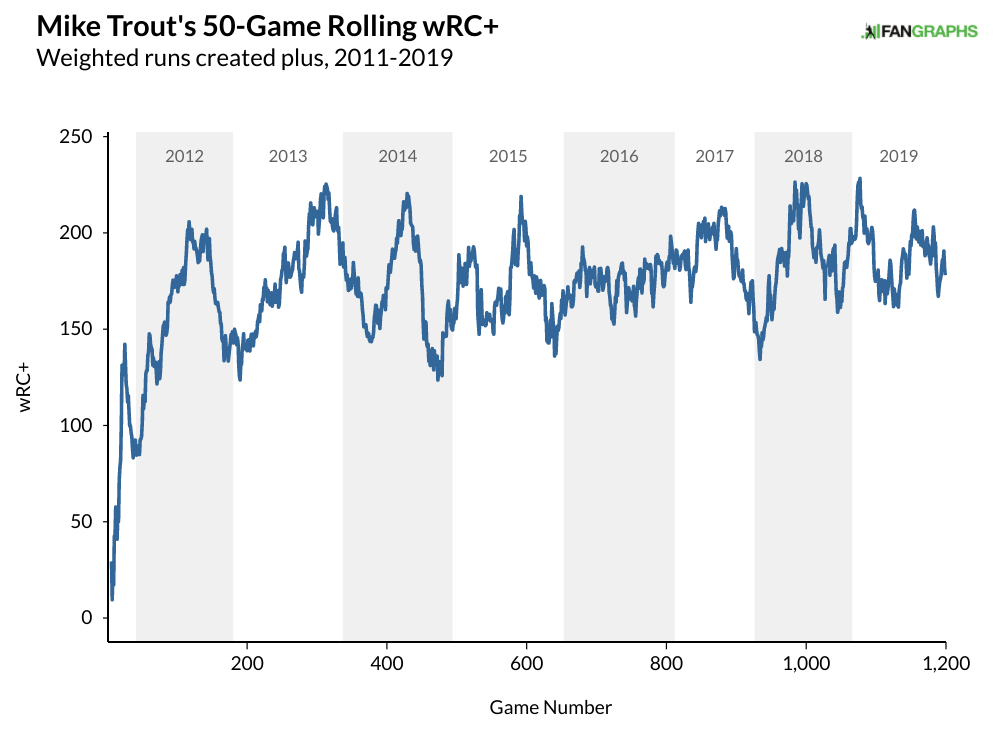Below is an analysis of the prospects in the farm system of the Oakland Athletics. Scouting reports are compiled with information provided by industry sources as well as my own observations. For more information on the 20-80 scouting scale by which all of our prospect content is governed, you can click here. For further explanation of the merits and drawbacks of Future Value, read this.
All of the numbered prospects here also appear on The Board, a resource the site offers featuring sortable scouting information for every organization. It can be found here.
Other Prospects of Note
Grouped by type and listed in order of preference within each category.
Bat-to-Ball Sleepers
Dustin Harris, 1B
Cobie Vance, 3B
Alexander Campos, 2B
Marcos Brito, 2B
Sahid Valenzuela, SS
Pretty self-explanatory group here. Harris, a 20-year-old JUCO pickup in last year’s 11th round, has a shot to be a four corners role player. Vance and Campos are thick-bodied infielders who are tough to strike out. I was all in on Brito’s hit tool for the last couple of years, and though he’s been young for each level, he hasn’t performed at all. Valenzuela is more of a glove-first, switch-hitting utility infield type, but I wanted to cheat him on here somewhere because I liked him while he was at Fullerton. He had TJ last year and was a shrewd 13th round pickup.
Pitchability Depth
Dalton Sawyer, LHP
Colin Peluse, RHP
Sawyer was a 40 FV backend starter prospect who has now missed the last two and a half seasons due to TJ and the pandemic. His delivery, fastball command, and ability to dump his curveball in for strikes should be enough for him to deal with lefties and Swayer’s best pitch, a late-sinking, bat-missing changeup, could be enough to keep righties at bay. He’s now 26 and hasn’t pitched at the upper levels because of circumstances out of his control. Peluse had TJ toward the end of high school and began his Wake Forest career in the bullpen before transitioning into a weekend starter role as a sophomore. He’s a pitchability righty with fringe stuff that plays up because Peluse’s delivery screws with hitters’ timing. He lulls hitters to sleep at the onset of his motion, then suddenly speeds up half way through his delivery, which catches hitters off guard.
Projectable Frames
Jalen Greer, 2B
Jose Dicochea, RHP
Lawrence Butler, 1B
Lester Madden, LF
T.J. Schofield-Sam, 3B
Three of these players were 2019 high school draftees. Greer was Oakland’s fifth rounder last year and really struggled in the AZL but he’s a cold weather high schooler from the Chicago area, so that’s not immediately disqualifying. Dicochea was their eighth rounder, a high school righty from Tucson who has been up to 96, sitting low-90s. His delivery needs some love. Schofield-Sam has quick hitter’s hands but his hand load was way too high and deep when I saw him as an amateur. He’s from Ontario so, like Greer, it’s probably going to be a slow burn. The same is true for Butler, though he’s first base-only. Madden signed out of Cuba for $300,000 and 2019 was his first pro season. He looked good during the spring and got off to a strong start at Beloit before floundering from June onward.
Older Dudes with Arm Strength
Aiden McIntyre, RHP
Jaimito Lebron, RHP
Robin Vazquez, RHP
Nathan Patterson, RHP
McIntyre pitched as a starter last year and, even at 89-93, his fastball was dominant because it has plus-plus vertical movement. His control is bad and he needs to move to the bullpen, where a velo bump could make his fastball really dominant. Lebron, 23, was a minor league Rule 5 pick from San Diego who sat 93-96 and touched 97 last year; he has a 45 cutter and 30 command. Vazquez, 22, was old for the AZL last year but he’s up to 95 with a fastball that spins at 2500 rpm. You probably know about Patterson’s story. He sits in the low-90s in games and has 40/45 secondary stuff.
System Overview
Assuming baseball is played this year and Puk, Murphy, and Luzardo have the opportunity to graduate, this is likely to become the worst farm system in baseball by the winter. That’s not an indictment on the org’s ability to find players. The reason Oakland remains competitive is because the amateur department drafted Matts Chapman and Olson (both of whom I was low on as prospects), while the pro department is responsible for Marcus Semien, Khris Davis, Ramón Laureano, etc.
Injuries are often a superficial reason farm systems look worse, but in this case they’re arguably helpful. All three top 100 types, as well as Kaprielian, Jefferies, and Holmes all probably would have graduated by now had they not been hurt for most of the last couple years.
Oakland is getting very little from its International program. Brito and Lazarito are barely hanging on, and Yerdel Vargas, Kevin Richards, Norge Ruiz, and little George Bell (injury) aren’t on here. I was high on several of those guys, too, but that group isn’t working out, which feels worse in light of the opportunity cost of that class. It kept Oakland in the bonus penalty box for the 2017 and 2018 signing periods, and then they dropped essentially their entire 2019 pool on Puason. This is a big reason this system is so shallow right now.

